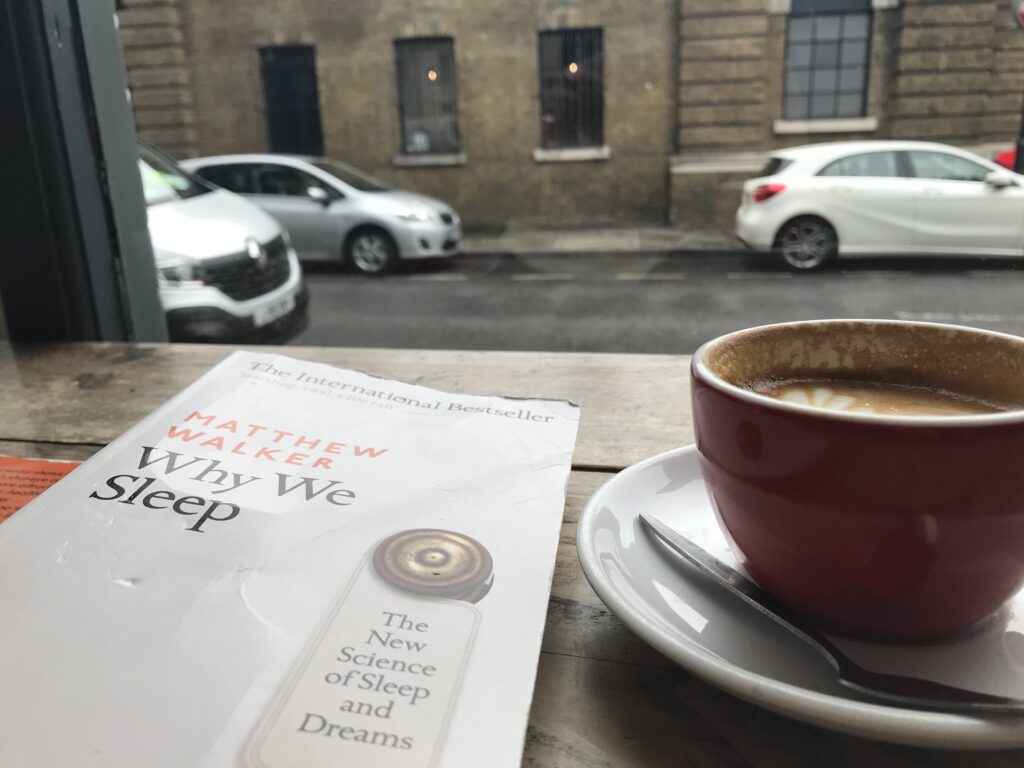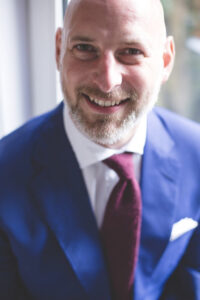
Name: Tim Beames
Profession: Physiotherapist
Book title: Why We Sleep – The new science of sleep and dreams
Author: Matthew Walker
What are you drinking? Probably coffee (although this may have to change after reading this book!)
A third of our lives
We all sleep, in fact we spend around a third of our life asleep, but are we doing it right? And what happens if we don’t?
Walker offers a wonderful narrative of science, discovery and practical tips. The health benefits of sleep are huge:
“Within the brain, sleep enriches a diversity of functions, including our ability to learn, memorize, and make logical decisions and choices. Benevolently servicing our psychological health, sleep recalibrates our emotional brain circuits, allowing us to navigate next-day social and psychological challenges with cool-headed composure.”
We learn about the circadian rhythm and patterns in “timed preferences for eating and drinking, your moods and emotions, the amount of urine you produce, your core body temperature, your metabolic rate, and the release of numerous hormones”. Subsequently, we see how sleep is synchronized to these activities – the influence of daylight, cues from the hormone melatonin and the build up of adenosine with sleep pressure from wakefulness – to determine our sleep(-iness).
Understanding a little about these should help when offering advice to a patient. For instance, what can influence the levels of melatonin? Caffeine can, especially when consumed up to 6 hours before your normal bedtime!
Walker, taking an evolutionary biology perspective, boldly states:
“At least two features define human beings relative to other primates. I posit that both have been beneficially and causally shaped by the hand of sleep, and specifically our intense degree of REM sleep relative to all other mammals: (1) our degree of sociocultural complexity, and (2) our cognitive intelligence. REM sleep, and the act of dreaming itself, lubricates both of these human traits.”
Stress and (poor) sleep
So what about the negative effects on sleep and health? Stress, unsurprisingly, can influence sleep in a number of ways:
“Raised metabolic rate…results in a higher core body temperature….we must drop core body temperature by a few degrees to initiate sleep, which becomes more difficult in insomnia patients suffering a raised metabolic rate and higher operating internal temperature, including in the brain.
…higher levels of alertness-promoting hormone cortisol, and sister neurochemicals adrenaline and noradrenaline. All three of these chemicals can raise heart rate. Normally, our cardiovascular system calms down as we make the transition into light and then deep sleep.
…related to these chemicals, are altered patterns of brain activity linked with the body’s sympathetic nervous system. [In insomnia patients] their emotion-generating regions and memory-recollection centers all remained active. This was similarly true of the basic vigilance centers in the brain stem that stubbornly continued their wakeful watch. All the while the thalamus – the sensory gate of the brain that needs to close shut to allow sleep – remained active and open for business in insomnia patients.
Simply put, the insomnia patients could not disengage from a pattern of altering, worrisome ruminative brain activity”.
These findings and their implications share interesting parallels to people suffering pain.
As a clinician I hear about sleep disturbance or un-refreshing sleep in many people experiencing pain. It would be wonderful to have the knowledge required to offer appropriate advice or help make better sense of what may be happening in them?
Building your understanding of sleep
I’d recommend all therapists to build their understanding of sleep. This book is a great place to begin and offers some simple tips to help guide our patients.
Twelve tips for healthy sleep (adapted from p.341)
- Stick to a sleep schedule
- Exercise is great, but not too late in the day
- Avoid caffeine and nicotine – caffeine up to 8 hours before, nicotine can wake with withdrawal symptoms
- Avoid alcoholic drinks before bed – robs you of REM sleep
- Avoid large meals and beverages late at night.
- If possible, avoid medicines that delay or disrupt sleep
- Don’t take naps after 3pm
- Relax before bed
- Take a hot bath before bed – the drop in body temperature getting out can help make you feel sleepy.
- Dark bedroom, cool bedroom, gadget-free bedroom.
- Have the right sunlight exposure. Daylight is key to regulating sleep patterns
- Don’t lie in bed awake. The anxiety of not being able to sleep can make it harder to fall asleep.

Based in London, Tim is a Principal NOI instructor and the lead physiotherapist and co-founder of Pain and Performance – an organisation with a special interest in the treatment and education of people suffering complex and persistent pain states. He is also is the co-owner of Le Pub Scientifique – a live learning organisation/partnership delivering informal events about pain, health and wellbeing in London and Amsterdam.
Tim has a Masters in Pain: Science and Society from King’s College London, has published book chapters and research on graded motor imagery and body perception, and has written and developed many postgraduate education courses for both Pain and Performance and NOI.
If you want to see Tim teaching, grab your passport and hang on, he has courses in the United Kingdom, Romania, Slovenia, Russia, Portugal, Finland, Turkey, Cyprus, and Greece!!


I read this one and really enjoyed it. Matthew didn’t talk anything about changes (if any) in our circadian rhythm with seasonal light changes. Did I miss it? Just it seems important if we’re to keep to a sleep schedule yet light affects our ‘wanting’ of sleep. Can anyone help me here?
Great point. I didn’t see that but he does mention in some detail the effect of travel, light changes and jet lag. Considering the effects of prolonged darkness on mental health in reported in some countries this might have a link? (Apologies Matthew Walker if I incorrectly remember!!)
Thanks
Tim
I don’t do much jet-lagable travel, so was waiting for the seasonal aspect as so many of us need to “withstand” it. To be honest I was hoping for a “sleep more in winter” comment. Wishful thinking no doubt 🙂
His message (I think) would probably meet your wishes i.e. you need to sleep the amount that is right for you at that particular time. He certainly maps out the social pressure/expectation leading us to sleep too little and offers ways to educate people about sleep at different levels (individual, group etc).
I’ll take it!